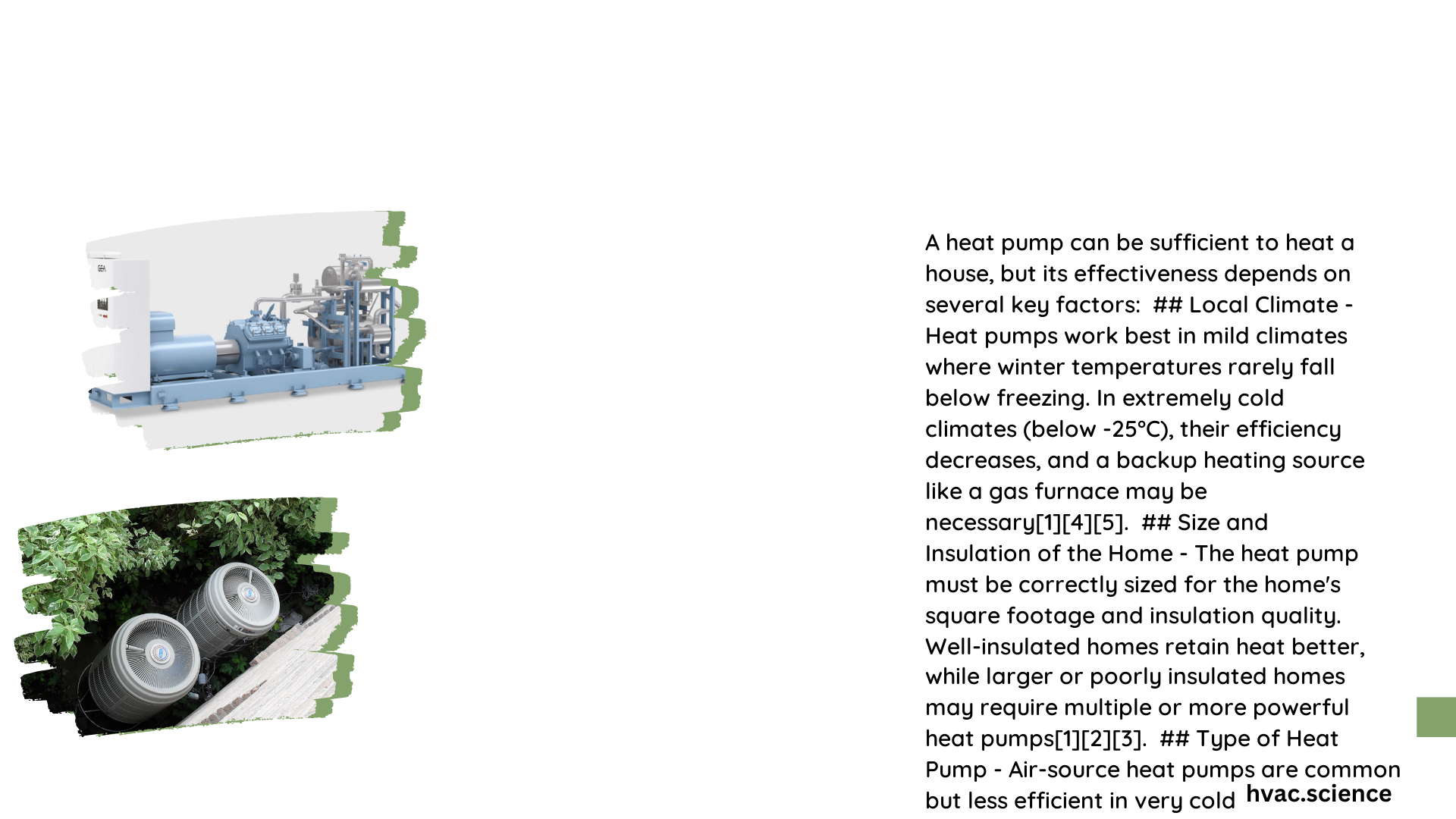Heat pumps have become increasingly popular as an energy-efficient alternative to traditional heating systems. However, many homeowners wonder if a heat pump can adequately heat their entire house, especially in colder climates. This article explores the capabilities of heat pumps, their efficiency, and factors that determine their effectiveness in heating a home.
What Is the Heating Capacity of a Heat Pump for a Typical Home?
Heat pumps are versatile systems that can both heat and cool a home. For a standard 2,000 square foot house in a moderate climate, the heating capacity of a heat pump can be estimated as follows:
- A common rule of thumb suggests 1 ton of HVAC capacity per 500 square feet of living space.
- For a 2,000 sq. ft. home, this translates to approximately 4 tons or 48,000 BTUs of heating or cooling capacity.
- It typically takes 24,000 BTUs to effectively heat or cool 1,000 square feet.
This capacity is generally sufficient for most homes in moderate climates. However, the actual heating capacity required can vary based on factors such as insulation, climate, and home design.
How Do Heat Pump Efficiency Ratings Impact Performance?

Heat pump efficiency is measured using two primary ratings:
- SEER (Seasonal Energy Efficiency Ratio): Measures cooling efficiency
- HSPF (Heating Seasonal Performance Factor): Measures heating efficiency
Here’s a breakdown of these ratings:
| Rating | Minimum Standard | High-Efficiency Models |
|---|---|---|
| SEER | 14 | 20 or higher |
| HSPF | 8.2 | 10 or higher |
Higher ratings indicate better efficiency, which translates to lower energy consumption and reduced operating costs. Compared to traditional furnace systems, heat pumps can be significantly more energy-efficient, especially in milder climates.
What Factors Determine the Appropriate Size of a Heat Pump?
Determining the right size for a heat pump involves more than just considering the square footage of a home. Professional HVAC technicians use two primary calculations:
- Manual J Load Calculation: This comprehensive assessment takes into account:
- Building envelope (windows, walls, roof)
- Insulation levels
- Local climate
- Appliances and internal heat sources
-
Occupancy patterns
-
Manual S Calculation: This uses the data from the Manual J to select equipment that matches the building’s specific heating and cooling needs.
These calculations are crucial because simple rules of thumb can be inaccurate due to the many variables affecting a home’s heating and cooling requirements.
How Do Heat Pumps Compare to Furnaces?
When considering whether a heat pump is enough to heat a house, it’s helpful to compare them to traditional furnaces:
Installation Costs:
- Heat pumps: $4,500 to $12,000
- Furnaces: $2,000 to $6,000 or more
Operational Efficiency:
- Heat pumps: Can achieve efficiencies of 300-400%
- Furnaces: AFUE ratings range from 80% to 98%
Lifespan:
- Heat pumps: 15-20 years or more
- Furnaces: 15-30 years or more
When Might a Heat Pump Be Insufficient for Heating?
While heat pumps are generally effective, there are scenarios where they might struggle:
-
Extremely Cold Climates: Heat pumps may lose capacity when temperatures drop below freezing. In very cold regions, a backup heating system might be necessary.
-
Poorly Insulated Homes: Inadequate insulation can cause heat pumps to work harder, potentially leading to higher energy costs and reduced comfort.
-
Oversized Spaces: If a heat pump is undersized for the area it needs to heat, it may not provide sufficient warmth.
What Are the Key Considerations When Choosing a Heat Pump?
When deciding if a heat pump is enough to heat your house, consider:
-
Climate: Heat pumps are most effective in moderate climates but can work in colder regions with proper sizing and supplemental heating.
-
Home Insulation: Well-insulated homes require less heating capacity, making heat pumps more effective.
-
Energy Efficiency Goals: If reducing energy consumption is a priority, heat pumps offer significant advantages over traditional systems.
-
Budget: While initial costs may be higher, long-term energy savings can offset the investment.
-
Dual Functionality: Heat pumps provide both heating and cooling, which can be a significant advantage in some regions.
In conclusion, for many homes, especially in moderate climates, a properly sized and installed heat pump can indeed be enough to heat a house efficiently and effectively. However, in extreme climates or poorly insulated homes, supplemental heating or additional measures may be necessary to ensure comfort throughout the winter months.
References:
1. Electric Dwelling: What size heat pump do you need for a 2000 sqft home?
2. HVAC.com: Heat pump capacity: 2-ton, 3-ton, and 4-ton
3. EnergySage: Heat Pump Sizing Guide: What Size Do I Need?
